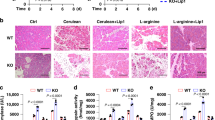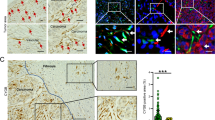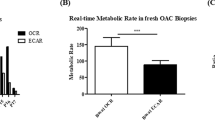Abstract
Nitric oxide (NO), an endogenous free radical, has been implicated in a wide range of biological functions. NO is generated enzymatically from the terminal guanidinonitrogen of L-arginine by nitric oxide synthase (NOS). Despite intensive investigations, the role of NO--either as the primary product of the L-arginine/NOS pathway or provided from the NO donor sodium nitroprusside (SNP)--in carcinogenesis and tumour cell growth remains unclear and controversial. The objective of this study was to examine the growth effects of NO on a ductal pancreatic adenocarcinoma in the rat and on a human pancreatic tumour cell line (HA-hpc2). In vivo, both SNP and endogenous induction of NO by endotoxins [lipopolysaccharide (LPS)] plus L-arginine significantly reduced the tumour growth. To investigate the mechanisms of NO anti-tumour growth action, the effects of either the SNP or L-arginine/NOS pathway were analysed on the HA-hpc2 cell line. Nitrite/nitrate production, NOS activity and iNOS expression [assessed by reverse transcription-polymerase chain reaction (RT-PCR)] were tested and related to growth (assessed by [3H]thymidine incorporation assay) and apoptosis (assessed by internucleosomal DNA cleavage). SNP exerted a dual effect on tumour cells: stimulation of the proliferation up to 1 mM and inhibition at higher concentrations. These effects were related to NO production. Both proliferative and cytostatic responses were inhibited by NO scavenger 2-phenyl-4,4,5,5-tetramethyl-hemidazoline-1-oxyl3-oxide (carboxy-PTIO). The marked apoptotic DNA fragmentation induced by SNP was also abolished by PTIO association. Unlike macrophages, the human pancreatic tumour cells did not seem to express intrinsically the L-arginine/NOS pathway. Macrophages were activated by HA-hpc2 cells as well as by LPS plus cytokines [interleukin (IL)-1beta plus tumour necrosis factor (TNF)-alpha and interferon (IFN)-gamma]. In HA-hpc2/macrophage co-cultures, NOS activity and inducible NOS (iNOS) transcription were stimulated, whereas an antiproliferative response was observed. These effects were related to both macrophage amount and NO production. Addition of LPS plus cytokines to co-cultures doubled iNOS activity, nitrite/nitrate production and tumoricidal effect. These data suggest the involvement of NO in pancreatic tumour growth and support the fact that generation of high levels of NO with potential production of endogenous reactive nitrogen intermediates may contribute to induction of apoptosis and tumour growth inhibition.
This is a preview of subscription content, access via your institution
Access options
Subscribe to this journal
Receive 24 print issues and online access
$259.00 per year
only $10.79 per issue
Buy this article
- Purchase on Springer Link
- Instant access to full article PDF
Prices may be subject to local taxes which are calculated during checkout
Similar content being viewed by others
Author information
Authors and Affiliations
Rights and permissions
About this article
Cite this article
Hajri, A., Metzger, E., Vallat, F. et al. Role of nitric oxide in pancreatic tumour growth: in vivo and in vitro studies. Br J Cancer 78, 841–849 (1998). https://doi.org/10.1038/bjc.1998.591
Issue Date:
DOI: https://doi.org/10.1038/bjc.1998.591
This article is cited by
-
Quantitative measurement of m-RNA levels to assess expression of cyclooxygenase-II, inducible nitric oxide synthase and 12-lipoxygenase genes in middle ear cholesteatoma
European Archives of Oto-Rhino-Laryngology (2014)
-
Tumor-Related Gene Changes in Immunosuppressive Syrian Hamster Cholangiocarcinoma
Pathology & Oncology Research (2013)
-
Nitric oxide: role in tumour biology and iNOS/NO-based anticancer therapies
Cancer Chemotherapy and Pharmacology (2011)
-
The role of nitric oxide in cancer
Cell Research (2002)



